Squarespace Review 2024: The Easiest Website Builder To Use
Easiest website builder to use
If you click to purchase a product or service based on our independent recommendations and impartial reviews, we may receive a commission. Learn more
Squarespace is one of the best website builders on the market, offering users a seamless user experience from start to finish. Its popular drag-and-drop editor and cost-effective plans make Squarespace ideal for beginners, and creatives will be more than happy with the design options available.
In this Squarespace review, I’ll explore why the builder is so user-friendly and what you can get for your money – a deep dive into the platform’s features to determine if it’s the right builder for you.
- Squarespace is the easiest website builder we’ve tested, offering an intuitive drag-and-drop editor
- Pricing ranges from $16 to $52 per month (billed annually)
- Consider using Squarespace if you have a creative business
| We recommend Squarespace for: | We don't recommend Squarespace for: |
|---|---|
| | |
Squarespace Pros & Cons
For an overview of the website builder, I’ve pulled together a list of Squarespace’s standout qualities and drawbacks:
What We Like
✔️ It’s the easiest website builder we’ve tested thanks to its drag-and-drop editor and AI design guidance
✔️ Over 160 aesthetically-pleasing templates to choose from, covering a broad range of industries and website types
✔️ If you want to offer bookable services or appointments, Squarespace’s Acuity Scheduling tool costs $16 per month
✔️ Add ecommerce functionality to your website for selling products and services online
What We Dislike
❌ Squarespace’s grid overlay in the editor can be useful for beginners but it does limit your creative freedom
❌ There’s no autosave when editing which seems like a flaw when Squarespace gives a lot of attention to designing a website
❌ Unlike Wix, Squarespace doesn’t offer a free plan – you can get started with its 14-day free trial instead
My Experience With Squarespace
Squarespace is the easiest website builder we’ve tested in 2024, outperforming 16 other platforms due to its simple drag-and-drop editor, intuitive interface, and beautiful templates. These perks make it easy for users to set up a website with Squarespace.
When testing Squarespace’s free trial myself, I was first presented with two questions:
- What’s your site about? – I could choose from a selection of options, such as “Food” or “Gaming”
- What are your top goals? – I could select as many relevant options as I wanted, such as “Build community,” “Sell products,” and “Offer a contact form”
From there, Squarespace gave me the option to choose from its professionally designed templates (with suggestions based on my responses), or I could build a template from scratch. Since I’ll discuss templates in detail later, I chose to use Squarespace Blueprint, a guided web design experience powered by AI.
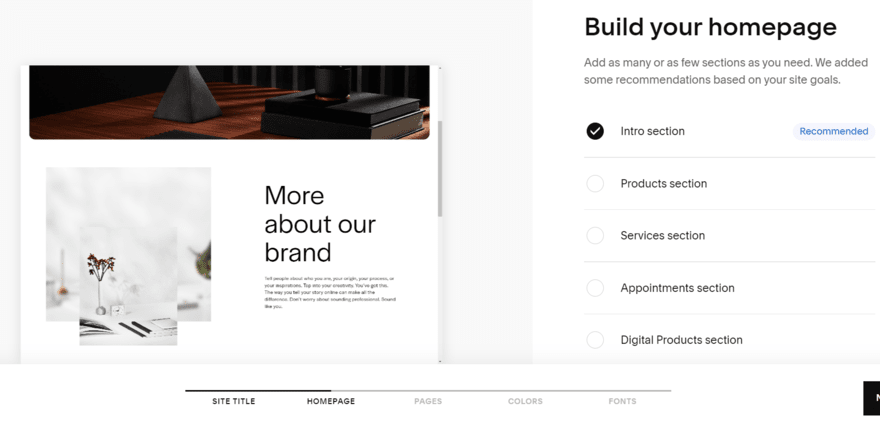
With Squarespace Blueprint, I was first asked for my website’s title. The next step is to build a homepage, choosing from a list of sections, such as the “Intro section” or “Social section.” I had the freedom to add or remove what I wanted, and I could choose from a variety of somewhat basic layouts for each section as well.
The final stage of Squarespace Blueprint includes adding pages to the site, deciding on a color scheme, and selecting a font style. Your decisions are not set in stone – you can edit everything in Squarespace’s editor.
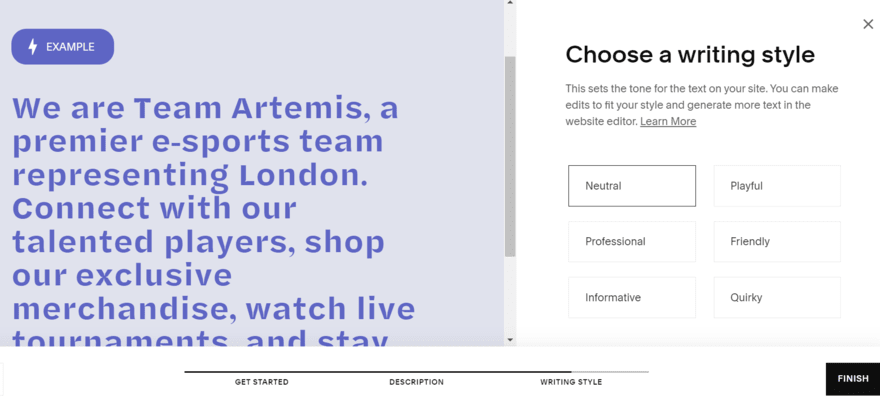
Once I was happy with my design, Squarespace gave me the option to personalize my website’s copy using Squarespace AI. After sharing a brief description of my website, I could choose a tone of voice, from options such as “Professional” or “Quirky.” I appreciated that the AI tool generated examples of each writing style so I could get an understanding of how the text would appear.
While the onboarding process wasn’t the quickest overall – especially when compared with the speedy setup of GoDaddy – Squarespace Blueprint provided a unique experience. For businesses short on time, Squarespace Blueprint takes the hassle out of designing and editing your pages.
That said, I would recommend choosing one of Squarespace’s templates because the designs are stylish and modern. The AI-generated templates look quite simple and bland in comparison, and there’s little variation between designs.
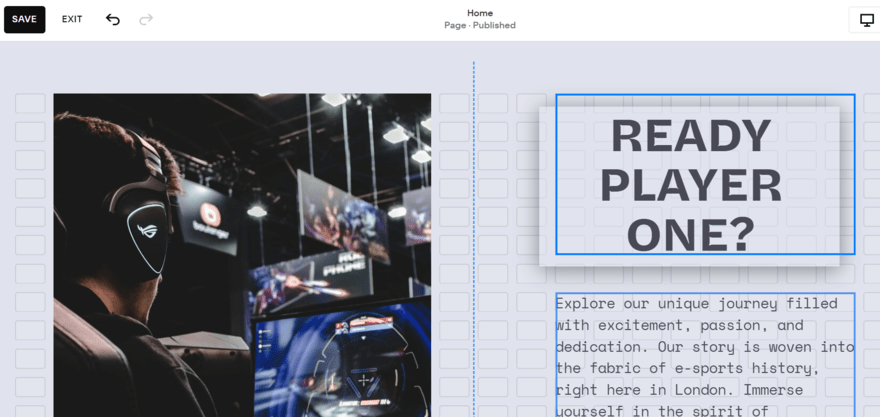
After this, I finally found myself in Squarespace’s editor. Like Wix, Squarespace uses a drag-and-drop editor so I could simply move elements around the page.
Squarespace also uses a grid pattern to add structure to its editor. This is useful if you’re looking to snap elements together or keep things aligned on your page, especially if you’re new to building websites. In my experience, it also helped to speed up the overall process.
However, if you’re looking for complete creative control, you’d be better off with Wix, which lets you drag elements anywhere on the page. Squarespace’s grid editor can feel restrictive since you’re bound to moving elements within the set lines.
You should also be aware that Squarespace has no autosave when editing – so keep this in mind when using Squarespace before you close a tab accidentally! Despite missing an autosave feature, I was relieved to see that Squarespace prompts you to save if you decide to exit the editor.
How Much Does Squarespace Cost?
Squarespace has four premium plans – the same number as Wix. Though Wix starts at a similar price point of $17 per month, Squarespace is more affordable in the long term and offers better value for money. Its plans range from $16 to $52 per month (billed annually):
- Personal ($16) – For simple sites, like portfolios
- Business ($23) – To start selling products and services
- Commerce Basic ($28) – Removes transaction fees and lets you sell on socials
- Commerce Advanced ($52) – Provides advanced sales features like abandoned cart recovery
You can also get 10% off your Squarespace plan with our code “WBE10”.
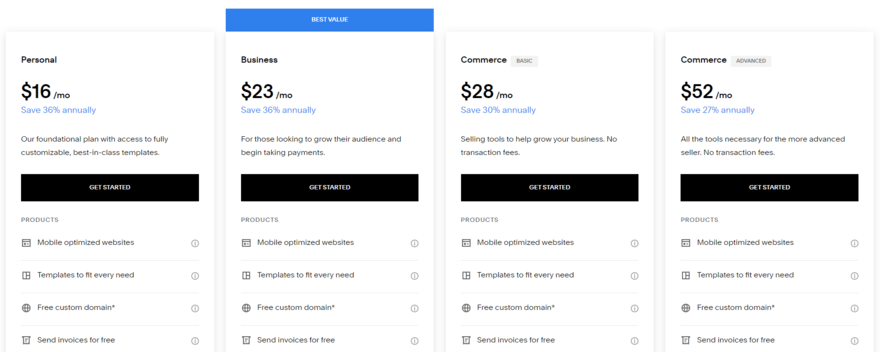
Squarespace’s Commerce Basic and Commerce Advanced plans increased in price as of April 2024, but Squarespace is still a cheaper ecommerce builder than Wix or Shopify.
Unfortunately, Squarespace doesn’t have a free plan, but you can get started with its 14-day free trial instead. You won’t need any card details to access the trial – simply sign up with an email address to test out the builder for yourself.
Once you’re ready to upgrade, the plan you pick will depend on the needs of your website. If you’re building a simple or largely informational website, like a portfolio, you’ll be content with Squarespace’s Personal plan.
For a slight price increase, I recommend choosing the $23 per month Business plan. You’ll unlock ecommerce functionality and additional features, including a branded Google email address and promotional pop-ups.
Check out our Squarespace Pricing Review to see which plan is right for you.
Designing With Squarespace
Squarespace is one of the best website builders for design and aesthetics, offering over 160 Squarespace templates to choose from. In comparison, Wix has 900+ templates in its library – as a result, our research found that Wix offers more variety across a range of industries when it comes to design.
That said, Squarespace’s templates have a high-quality finish and cover a wide range of industries, such as “Fashion” and “Fitness,” despite offering fewer options than Wix. I particularly like the “Montclaire” template for artist websites because of its minimalist approach to showcasing work. Squarespace’s recent 2024 Super Bowl ad, directed by Martin Scorsese, also introduced a new template called “Hello Down There.”
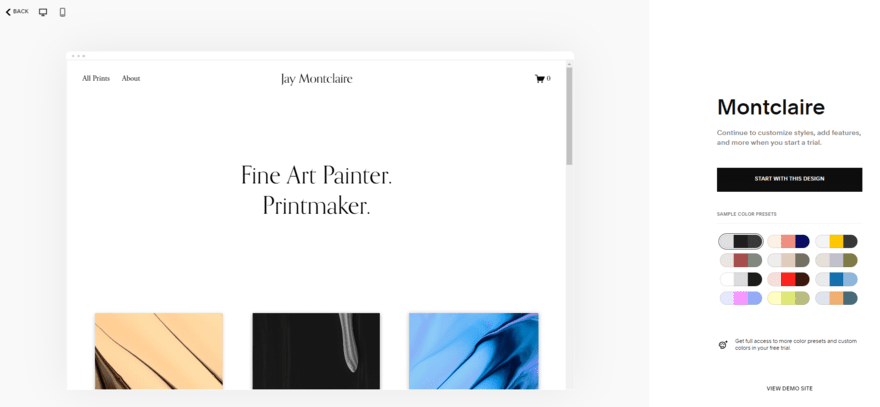
Once you’re in the editor, Squarespace gives you access to a lot of professionally designed elements and sections to add to your site. This is especially useful for content-heavy sites looking to display information in creative ways, such as accordions or scrolling banners.
To add new elements, I simply had to click “Add section” in the editor and choose from a variety of designs. For example, I added a “Contact” section to the bottom of my homepage.
I also loved that I could save favorite sections to revisit at a later time, giving me the freedom to experiment when designing my pages.
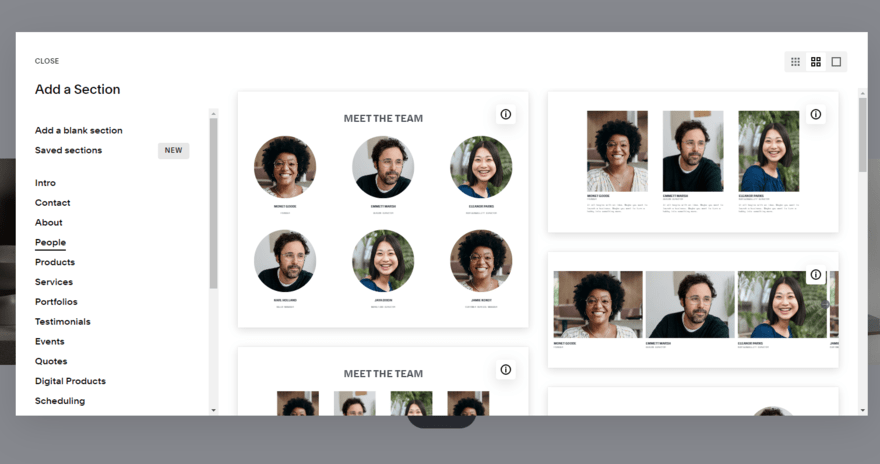
Squarespace’s Features
Squarespace provides a generous suite of built-in features, including marketing tools and website analytics to help users monitor their site’s performance. You can also explore the Squarespace Extensions page for additional functionality – however, with roughly 40 integrations to choose from, it’s not as large-scale as Wix or Shopify’s app markets.
Scheduling Tools
Squarespace is the best website builder if you’re looking to offer bookable services or take appointments. Whether you’re selling online courses or offering in-person fitness classes, Squarespace’s Acuity Scheduling tool lets you create appointments, manage timings, and set prices from a dedicated dashboard.
To use Acuity Scheduling, click “Scheduling” in the account dashboard.
When testing the tool myself, I found it incredibly easy to set up new appointment types for 1:1 sessions or group classes. Squarespace guided me through the process step by step, instructing me to set my availability and design my scheduling page.
While the feature is accessible during Squarespace’s 14-day free trial, Acuity Scheduling plans range from $16 to $49 per month (billed annually) – this is an additional fee on top of your monthly or annual Squarespace plan.
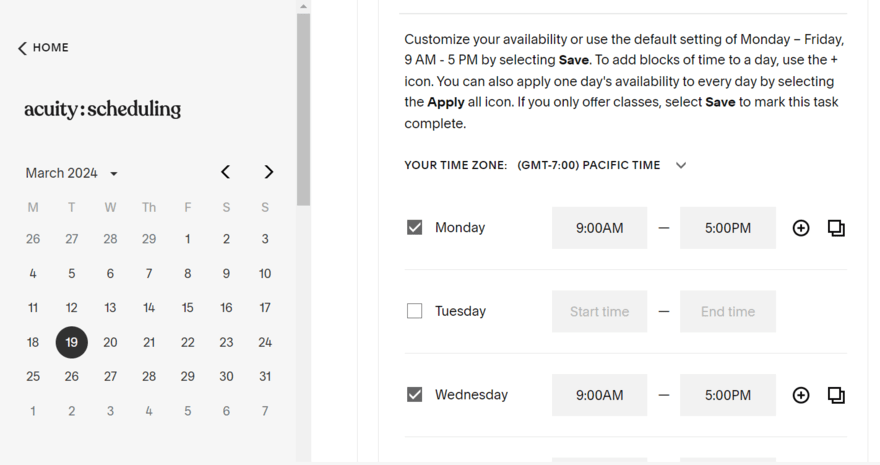
SEO
Like most SEO website builders, Squarespace provides the essentials, such as image alt text, mobile optimization, and automatic sitemaps. All of this is built into the platform, which is standard for most website builders, including Wix and Shopify.
With Squarespace, you can easily manage your site’s SEO from its SEO panel. This is accessible via your account’s settings, under “Marketing” – labeled “SEO Appearance.” From here, you can view a useful SEO checklist, view your keywords, hire an SEO expert, and preview your site’s metadata to help you optimize your site for search engines.
To tweak your page’s SEO data, click into “Pages” and select the cog icon to view each page’s settings.
Unfortunately, Squarespace did perform poorly in our site speed tests. A slow website can impact your site’s performance in the Search Engine Results Pages (SERPs). Plus, you don’t want your visitors or customers to grow frustrated and take their business elsewhere.
Marketing
All websites need to engage with their target audience, whether you’re looking to simply showcase your work or sell products online. Squarespace provides access to a variety of marketing tools, such as promotional pop-ups, featured announcement bars for exciting website or business updates, and a dedicated tool called Email Campaigns.
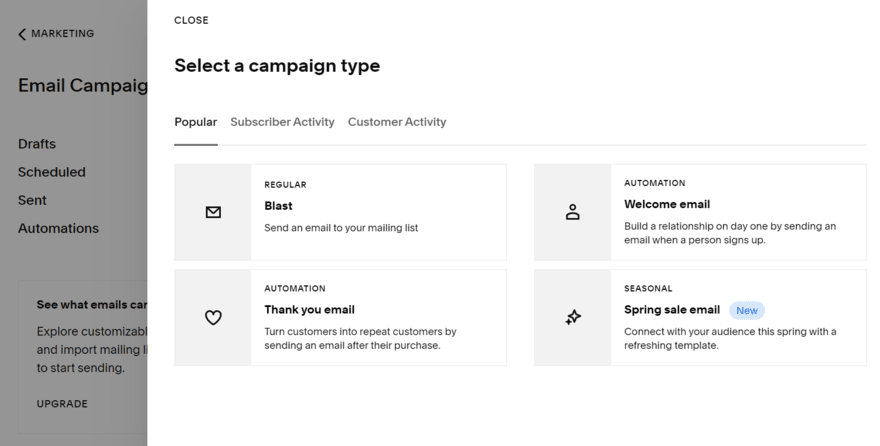
Squarespace Email Campaigns lets you automate workflows, engage with your subscribers, and view email-specific analytics. This is a must-have for businesses looking to build customer relationships through their website.
When exploring the feature, I could choose from a handful of email types, including a “Welcome email” and a seasonal extra for springtime sales. While some features of the tool are free (like creating draft campaigns), you’ll need to purchase a full Email Campaigns plan to send campaigns. Pricing for the feature starts from $5 per month (billed annually).
Selling Online With Squarespace
Squarespace has improved considerably since last year’s research and takes third place in our ecommerce website builder research, sitting just behind Shopify and Wix. You’ll need either the Business, Commerce Basic, or Commerce Advanced plan to sell with Squarespace – prices start from $23 per month (billed annually).
Squarespace does have better sales features than Wix overall. For example, Squarespace’s ecommerce plans allow you to list unlimited products, whereas Wix’s plans have a limit of 50,000 products.
To add products, navigate to “Selling” in your Squarespace account. The first step on the page directs you to add products, so I found it easy to start building my inventory. Squarespace asked what kind of product I wanted to sell, such as “Physical” or “Video on demand,” and I added the relevant information and imagery.
However, Squarespace falls short when it comes to internationalization, requiring manual translation and only supporting a few languages – an area where Wix shines. This isn’t ideal if your store is looking to expand into new markets.
I recommend the Business plan as a good starting point for small businesses, but if you have a larger or growing inventory, one of the two Commerce plans will be best. Both the Commerce Basic plan and Commerce Advanced plan remove transaction fees entirely, plus you’ll get access to advanced sales features, like abandoned cart recovery and low-stock labels.
Read our Squarespace Ecommerce Review page for a detailed look at its sales features.
Squarespace’s AI Tools
Squarespace is a little underwhelming when it comes to AI features and seems to lag behind the competition. Wix, for example, recently announced its new AI website builder, and Shopify’s Winter ‘24 Edition included the reveal of an AI-powered storefront search feature.
Unfortunately, we haven’t heard much from Squarespace since the Squarespace Refresh in October 2023. This did give us a sneak peek at Squarespace’s vision for AI in the future, including AI image support and an AI assistant, but these features are still in development.
Here are the AI tools you can expect from Squarespace now:
- AI website builder – Squarespace Blueprint is powered by AI to help you generate a custom template for your website, but this isn’t as hands-free an experience as other AI builders
- Text generation – use AI to create content for text boxes, generate product descriptions, and fill out email marketing campaigns
When in the editor, I used Squarespace’s AI text generator by clicking the lightning bolt icon on a text box. I could then decide if I wanted a paragraph, pitch, or blurb, before inputting a relevant prompt. The generated text was detailed and perfectly personalized to my business.
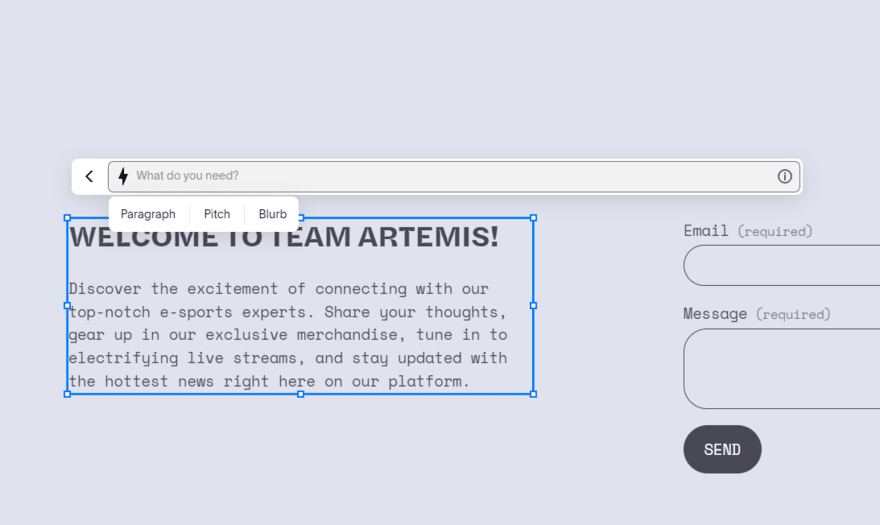
How Can Squarespace Protect Your Site?
All Squarespace websites offer “white glove website security,” meaning you’ll receive a reliable and high-quality service from the website builder. Every website using a Squarespace custom domain will be bundled with a free SSL certificate. This helps protect your website’s data, reassures visitors, and it also boosts your site’s credibility with search engines.
You can also rest assured that Squarespace is PCI-compliant (to protect online payments), follows global data privacy laws (to keep your data secure), and monitors for cyber threats and DoS attacks 24/7.
If you want to take extra precautions, you can enable two-factor authentication on your Squarespace account, review your account’s login activity for suspicious activity, and password-protect any pages you desire.
Squarespace Support
You can seek support from the following Squarespace channels:
- 24/7 email support
- Live chat (available Monday to Friday between 4AM and 8PM EST)
- Social media
- Help Center including guides, video tutorials, and webinars
- Community forum to hear from real Squarespace users
- Hire a Squarespace Expert to help you overcome a hurdle, including building a website from scratch
As you can see, there are several options to choose from if you need a helping hand, but you won’t be able to call Squarespace’s customer support team.
Still, I was impressed by Squarespace’s Help Center since most guides included a video along with links to other resources – supporting users with different learning styles.
However, I was slightly disappointed in Squarespace’s live chat. While it’s nice to interact with a human instead of AI, it took over 30 seconds to get a response. This doesn’t seem too extreme, but the AI-powered live chats of Squarespace’s competitors (like Wix and Shopify) responded almost instantly.
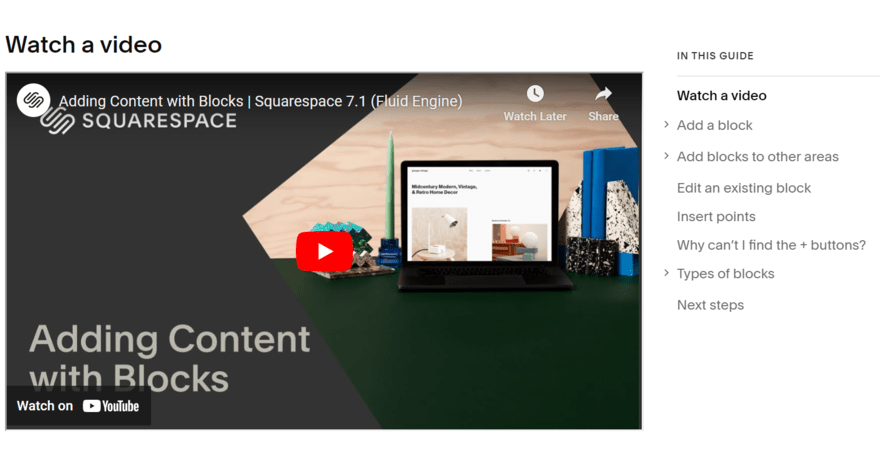
How Does Squarespace Compare to Competitors?
Squarespace is our second-best performing website builder in 2024, but is it the right fit for you? Take a look at how it compares with other leading website builders in the table below:
 |  |  |  |
| Squarespace | Wix | Shopify | GoDaddy |
| Overall Rating 4.6 | Overall Rating 4.8 | Overall Rating 4.4 | Overall Rating 4.3 |
| Starting from | Starting from | Starting from | Starting from $9.99 |
| Free plan or free trial 14-day free trial | Free plan or free trial Free plan | Free plan or free trial 3-day free trial | Free plan or free trial Free plan |
| Number of templates 150+ | Number of templates 900+ | Number of templates 150+ | Number of templates 200+ |
Wix is our top-rated website builder overall, offering users a comprehensive solution with powerful features, over 900+ templates to choose from, and dependable support options. It’s also an impressive choice if you’re looking to sell online thanks to its versatility.
That said, Shopify is the best ecommerce website builder out there, providing dedicated sales features and room to scale your business until you’re among the titans of your industry.
GoDaddy has the fastest setup and affordable plans. With pricing that ranges from $9.99 to $20.99 per month (billed annually), GoDaddy is the best value for money builder we’ve tested in 2024.
If you’re still not sure what website builder is right for you, take our 4-question quiz for a personalized recommendation from the experts:
How We Test Squarespace
To fairly review Squarespace, we rely on our rigorous in-house research process. We regularly test every website builder we recommend so that we can share accurate and impartial recommendations.
After 200+ hours of testing and data collection across 398 areas of investigation, we can confidently say we know Squarespace inside and out. Our review examines six key areas that we know are important to our readers:
- Website Features – 30%
- Looking at the quality and number of features on offer
- Design Functionality – 25%
- Reviewing a website builder’s aesthetic capabilities, through templates and design options
- User Experience – 17%
- We test every builder ourselves so we can share our experiences and assess how easy it is to use
- Help and Support – 10%
- Looking at how website owners can contact a platform or get support
- Value for Money – 10%
- We review pricing and what’s available with each plan
- Customer Score – 8%
- Comparing a website builder to its competitors in the market
Each category is given a unique weighting and a builder is awarded a score out of five depending on its performance in each of these testing areas.
Squarespace Test Summary 2024
I’ve tested a lot of website builders as part of the Website Builder Guide team and Squarespace always delivers a delightful experience. It’s so easy to use, and I never run into any difficulty no matter what type of website I’m trying to build, whether that’s a creative portfolio, photography website, or online store. This is why we’re so quick to recommend the builder to beginners – it’s a great starting point for anyone scared of technology!
I’d recommend choosing one of Squarespace’s templates, instead of using Squarespace Blueprint to begin with. The templates are polished and trendy, so you’ll only need to make a few tweaks here and there to fit your brand. And, with the grid-style drag-and-drop editor, it’ll be hard to make anything very ugly. Squarespace really sets you up for success with its user-friendly editor.
Another thing I love is how seamless it is to jump between the website editor and backend settings. While you’ll need to remember to manually save each time, it’s simple to navigate between setting up email campaigns to managing your site’s SEO.

Squarespace Review: Should You Choose It?
From our 2024 research, Squarespace is the easiest website builder to use by far. I’ve explored its user-friendly editor in detail, highlighted its stylish templates, and examined the features on offer, from website security to SEO.
Like Wix, Squarespace is a reliable option for a wide range of users, whether you’re looking to build a creative portfolio or set up an online store. That said, I highly recommend choosing Squarespace if you’re a beginner at building websites because of its intuitive interface and simple setup process.


790 comments